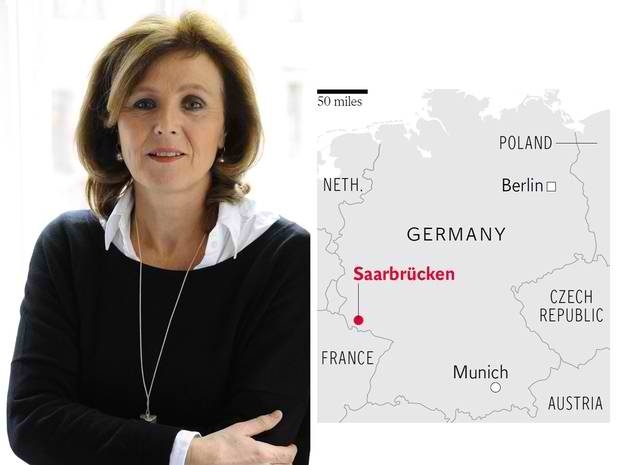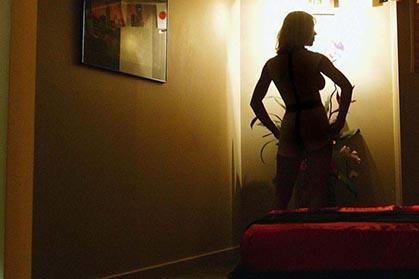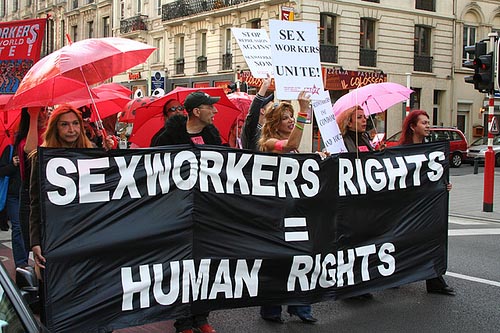The German town of Saarbrücken was once renowned for its fine Moselle wines, first-class cuisine and an easy going un-Teutonic way of life.
Yet the border city’s fame as a laid-back gourmet paradise is now fast being overtaken by a new and unsavoury reputation as Europe’s prostitution capital.
The reasons are self-explanatory: the city has 170,000 residents and a population of over 1,000 call girls. The numbers grew after 2007 when Bulgaria and Romania gained EU membership. Since then there has been a steady influx of women plying the sex trade, often to escape poverty at home.
Early next year their numbers will swell even further with the opening of a new €4.5m (£3.8m) 6,000sq-metre “mega brothel” in Saarbrücken’s Burbach district. It will employ 90 full-time prostitutes and be run by a permanent staff of 45. The establishment has been described as one of the largest brothels in Europe.
Local authorities bemoan the fact that they have virtually no power to halt the expansion of the city’s already booming sex industry: “In Saarbrücken it is easier to open a brothel than a chip shop,” Charlotte Britz, the city’s Social Democratic Party mayor, said. “Prostitution has assumed unbearable proportions here.”
It is not difficult to understand the Mayor’s concerns. From her office, Ms Britz has a grandstand view of the two brothels that stand directly opposite Saarbrücken’s town hall. “The current situation is bad for the city’s image,” she said.
Two factors have combined to create Saarbrücken’s seemingly unstoppable sex trade boom.
The first is what was once hailed as an “enlightened” German government decision to liberalise what were considered to be outdated and repressive laws governing prostitution and the sex trade. Back in 2001, under Chancellor Gerhard Schröder, Germany’s governing Social Democrat-Green coalition tried to make prostitution a job like any other by passing laws that gave call girls full rights to health insurance, pensions and other benefits provided they paid the requisite taxes.
While exploiting prostitutes remained criminal, employing them or providing sex workers with a place to ply their trade was declared legal. The change in the law was an attempt to encourage responsible, law-abiding brothel owners, who, it was assumed, would eventually drive pimps from the market and end the exploitation of sex workers.
The second factor that has contributed to the boom in the sex trade is the city’s proximity to France, where the legality of prostitution is a grey area. In France, prostitution is illegal in principle, but it is not illegal to be a prostitute. It is illegal to run a brothel or to be a pimp or to solicit even “passively” in public, but it is not illegal to sell your body – or “buy” someone else’s. And this week, France passed a controversial bill meaning anyone caught paying for sex will be fined a €1,500 for a first offence.
Saarbrücken, a mere hop over the German border from the French cities of Strassbourg, Nancy and Metz, is already flooded with French male sex tourists at weekends and the new fine seems destined to boost trade even further. The Stuttgart concern Paradise Island Entertainment, which is behind the city’s new mega-brothel project, said it chose the city precisely because of its proximity to France. But Saarbrücken is simply an extreme example of what has occurred in most large German cities since the liberalisation laws of 2001. The country has become a magnet for sex tourism, with an estimated 400,000 prostitutes catering for a million men each day.
Statistics suggest that the aim to make prostitution a job like any other has backfired badly. Just 44 prostitutes are reported to have registered for welfare benefits so far and critics say that well-meaning legislation has helped, rather than discouraged, pimps.
Most health-insurance companies refuse to accept prostitutes as customers at reasonable rates because of what they say are the inherent risks involved. Taxes on brothels are usually passed on to the call girls who work in them, while uncontrolled street prostitution involving new arrivals from Eastern Europe continues to thrive.
Germany’s future “grand coalition” government this week signalled that it would rein in some aspects of the 2001 laws in an attempt to get a grip on the problem. Chancellor Angela Merkel’s conservative Christian Democrats and their prospective Social Democrat partners said they would ban so-called “flat-rate” sex offered by some brothels and provide better protection for victims of enforced prostitution.
However, critics have complained that such proposals do not go nearly far enough. In Saarbrucken, insiders in city’s red light scene say the measures would make “absolutely no difference” to the city’s booming sex trade.
The backlash against Germany’s prostitution explosion is being driven by the country’s renowned 1960s’ feminist activist Alice Schwarzer. She argues that prostitution has become a form of modern slavery.
IN NUMBERS
400,000: Estimated number of prostitutes working in Germany
44: Number of German sex workers covered by social insurance
1,000: Estimated number of prostitutes in Saarbrucken
€4.5m: Cost of new “mega-brothel” in Saarbrucken







Gee, let’s solve all the ancillary problems related to prostitution by outlawing it. That’s worked so well wherever it’s been tried.
The bias in this piece sticks out like a baseball bat.